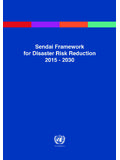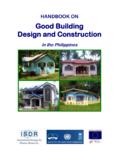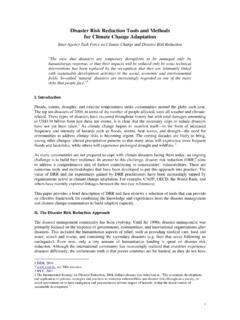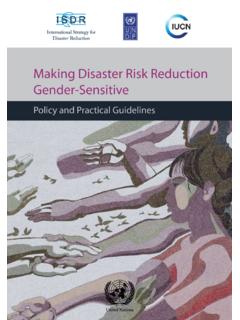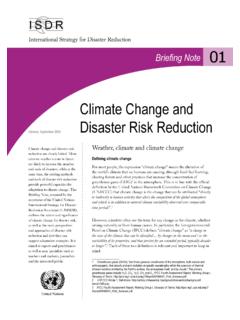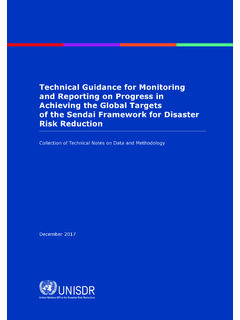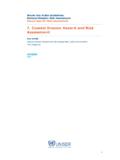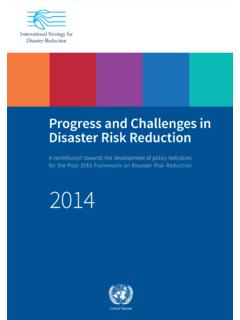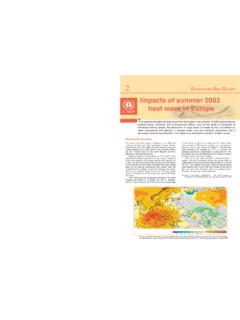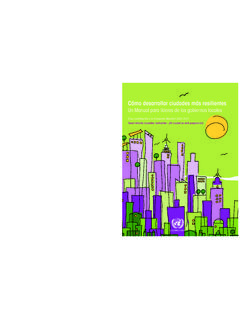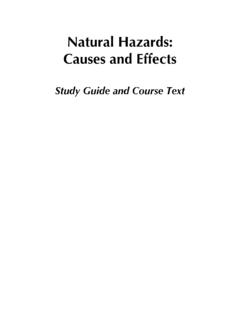Transcription of Natural and human-induced environmental hazards - UNISDR
1 Strengthening international science for the benefit of societyReport from the ICSU Scoping GroupNatural and human -inducedenvironmental hazardsICSU Scoping Group on Natural and human - induced environmental hazards * Report to theICSU 28th General Assembly,Suzhou, China October 2005 The ICSU 28th General Assembly decided that the name of the proposed programme be changed to Natural and human - induced hazards and Disasters . 2 List of Contents Summary .. 5 Science and Natural hazards an ICSU 7 2 Natural hazards and Disasters .. 9 9 management .. 11 3 The ICSU Community and Natural hazards .. 13 .. 13 .. 14 observation initiatives .. 14 .. 15 15 .. 15 16 .. 17 .. 17 17 Year of the Planet Earth .. 17 4 Scientific Aspects of Natural hazards in the UN 18 Strategy for disaster 18 Nations Environment 18 19 Oceanographic Commission of UNESCO.
2 19 Meteorological Organisation .. 20 Summit on Sustainable 20 5 The Policy 21 6 Options for ICSU .. 23 24 in the international research effort .. 24 between science and policy-making .. 25 for an ICSU hazards programme .. 26 28 Annex A: Membership of the Scoping Group .. 30 Annex B: Terms of Reference for the Scoping Group .. 32 Annex C: Definition of Terms (taken from the ISDR terminology) .. 33 Annex D: Acronyms and 35 3 4 SummaryThe frequency of recorded Natural disasters rose markedly during the last century, from about 100 per decade up to 1940 to nearly 2800 per decade during the 1990s. Three-quarters of these disasters are triggered by weather-related events. Population growth in hazardous areas means that more and more people are at risk, and the increasing dependence of urban communities on complex infrastructure brings with it an increasing vulnerability to disruption.
3 The 2002 World Summit on Sustainable Development highlighted the extent to which progress in development can be wiped out by Natural disasters. The IPCC foresees that the severity of the impacts of extreme events will increase in concert with global warming. So Natural hazards and Natural disasters are becoming more and more prominent. World leaders in a variety of fora are bringing the subject into the mainstream of political concern. This report outlines the possible scope of an ICSU initiative on Natural and human - induced environmental hazards . There is extensive research on individual hazards how hazardous events are triggered, how to improve forecasting, how events unfold, how they cause damage, etc. We suggest that the greatest shortfall in current research activities lies not so much in scientific work itself as in research on how science is used to shape social and political decision-making in the context of hazards and disasters, and it is here that our proposal is principally report recommends the appointment of a Planning Group to develop the details of an ICSU hazards initiative.
4 The initiative should take the form of a programme of research aimed at strengthening international science to provide a firmer basis for policies to prevent Natural hazards from becoming disasters. Such an objective will need:xan international collaborative research programme lasting a decade or more; xthe combined insights of the Natural , health, social and engineering sciences; xengagement with populations living in hazardous areas, to understand better the social and cultural determinants of choice in the hazards context; xengagement with policy-makers at regional, national and international level, to understand better the constraints on policy-making in the hazards context; xthe ability to accommodate both individual hazards and the interplay between hazards ; xa long-term perspective; and xa focus on delivering new scientific insights for the primary customers: development agencies, humanitarian assistance agencies and governmental policy-makers.
5 This is an ambitious undertaking, in keeping with the importance and complexity of the subject. ICSU will need to work with appropriate partners to achieve its goals. 5 6 Science and Natural hazards an ICSU Statement1As the recent tragic events in the Indian Ocean have shown only too vividly once again, Natural hazards (earthquakes, tsunamis, floods, hurricanes, landslides, tornadoes, volcanic eruptions, and other geophysical phenomena) are an integral component of life on Earth. These can have disastrous effects on vulnerable communities and ecosystems. Only by understanding how and where such hazards may occur, what causes them, what circumstances increase their severity, and what their impacts may be, will it prove possible to develop effective mitigation strategies. In practice, this requires addressing issues such as real-time monitoring and prediction, emergency preparedness, public education, post- disaster recovery, engineering, land use, and construction practices.
6 Coordinated approaches involving scientists, engineers, policy makers, builders, investors, insurers, news media, educators, relief organizations, and the public are therefore essential if the devastating effects of Natural hazards are to be reduced. In order to reduce vulnerability to Natural hazards , the International Council for Science strongly endorses the need for: xfundamental research on the Earth system and its dynamics, xintegrated research on the impact of Natural disasters on social and ecological systems, xagreement on an international global observation framework for the collection, management and open sharing of data and information on Natural hazards , xmapping of the known exposures of human populations, resources and economic activities to multiple disasters, xintegrated models that combine geophysical, ecological, demographic and economic aspects of disaster scenarios, xestablishment of coordinated international detection and early warning systems, xbuilding of indigenous scientific and technical capacity in vulnerable regions to take advantage of existing knowledge and stimulate local innovation.
7 Xdevelopment and evaluation of prevention and mitigation programs in the most risk-prone areas, xdissemination of the relevant results to policy makers and the public, and xa renewed focus on public education, particularly in vulnerable communities. Science has contributed much to the understanding of Natural hazards but, as recent events have shown, the Natural environment remains dangerously knowledge and technologies are not always available when and where they are needed. A new strategic international and interdisciplinary approach to science is necessary to more fully exploit existing knowledge and identify and address the unknown. At the same time more effective strategies for mitigation of the effects of Natural hazards need to be developed and deployed. Only when good science and policy making are effectively combined will the world become a safer place.
8 _____1 This statement is based on material from the American Geophysical Union (1996, 2000: ); the International Union of Geodesy and 7 Geophysics (Jan 2005: or ); the ICSU Committee on disaster Reduction ( 2002: ); and, the International Global Observing Strategy ad hoc Working Group on Geo- hazards (2002: ). It also draws on some of the recommendations made in a letter from Lerner-Lam et al that was published in the Los Angeles Times on 30 December 2004 ( ,1,3003421, ). The statement is endorsed the Executive Board of the International Council for Science (ICSU, January 2005). ICSU is a non-governmental organization representing a global membership that includes both National Scientific bodies (103 members) and International Scientific Unions (27 members). The Council is currently exploring the establishment of a new international interdisciplinary program on Natural and man-made hazards .
9 This will build on ongoing plans for the Year of Planet Earth, involving the Geo-Unions and UNESCO ( ). 81 Introduction The ICSU Priority Area Assessment on Environment and its Relation to Sustainable Development (2003),1 reviewing strategic options for future ICSU activities related to environmental research, proposed Natural and human - induced hazards as one of four possible new fields of work. This field was also highlighted as an emerging scientific issue in the ICSU Foresight Analysis (2004).2 ICSU has been involved, as an institutional partner, in preparing the Geohazards Theme3 of the Integrated Global Observing Strategy Partnership, and has been active in a number of other initiatives related to scientific4 aspects of Natural hazards . From a number of directions, then, the Natural hazards theme has been coming to the fore as a possible candidate for a substantive ICSU initiative.
10 The ICSU Executive Board therefore appointed a group to recommend the scope of a possible ICSU initiative in this area and report to the ICSU General Assembly. The membership of this Scoping Group, drawn from a wide range of Natural and social science disciplines and institutional contexts, is given in Annex A. The Group s terms of reference are given in Annex B. 2 Natural hazards and Disasters Recent trends The devastating effects of the 1995 Kobe earthquake in Japan, the December 2004 Indian Ocean tsunami and the August 2005 Hurricane Katrina in the United States are vivid reminders that Natural disasters5 are a global issue and can result in great loss of human lives, livelihoods and economic assets in both developed and developing countries. But while very large events are, fortunately, fairly rare, the frequency of recorded Natural disasters has been rising rapidly.
